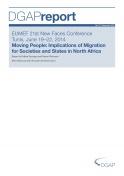Click here for the comprehensive report
Foreword
Migration in the Mediterranean region goes beyond images of small boats overloaded with refugees trying to cross the sea in pursuit of a better life in Europe. These images and the associated narratives fail to provide a comprehensive picture of the multitude of reasons and effects of people moving in the region. The area including North Africa, the Levant, Turkey, and the EU has always been the site of many of these different movements, and since the uprisings of 2011, new dynamics and alarming realities have been added to the phenomena. To mention a few examples, Libya, which had been the destination of labor migration for decades, became a starting point for refugees during the war in 2011. Tunisians who had migrated to the Gulf States and other countries returned when political change was underway in their homeland. And in Syria the brutality of the civil war and the dramatic deterioration of living standards has forced millions of people to flee, either becoming internally displaced or seeking refuge in neighboring countries or other countries in the region, including North African countries.
Migration flows are complex and varied phenomena. People leave their countries of origin for different reasons, either forced by violent conflict or responding to political, social, or economic factors, or a combination of both. Their movement is not necessarily unidirectional, as exemplified by multiple internal displacements, return movements, and seasonal migration. In all cases, movements of people alter and influence societies, both in sending and receiving countries. For example migrants can be powerful political actors transforming their host as well as their home countries through active political engagement, but they can also shake fragile political and social equilibriums and contribute to destabilization with a “spillover effect” on neighboring countries. They can positively contribute to economies through work and remittances, but they can also cause “brain drain” and antagonize the local work force. In this context, migrants are often confronted with xenophobia and racism and serve as scapegoats for all sorts of grievances, which only adds to the misery caused by traumatic experiences, material hardship, and bureaucratic burdens.
As a consequence, the presence of migrants heavily shapes discourses and notions of citizenship, identity, and statehood, directly affects social cohesion and stability, and hence confronts states and international organizations with enormous challenges. International organizations do play a role in providing relief for affected people. But in the absence of a binding global regime to govern the international movement of people, migrants depend primarily on the interests of and cooperation between nation states.
This conference aimed primarily to analyze more recent flows of people stemming from, or targeting, countries in North Africa and to explore their political, social, and economic impact on sending and receiving societies. It enabled cross-country comparisons and exchange of experiences and brought together academics, practitioners, and activists working in the field. It shed light on migration policies of relevant actors and identified necessary, missing measures that place the human rights dimension at the center of the debate and the policy-making process.
Dina Fakoussa
Head of EUMEF

